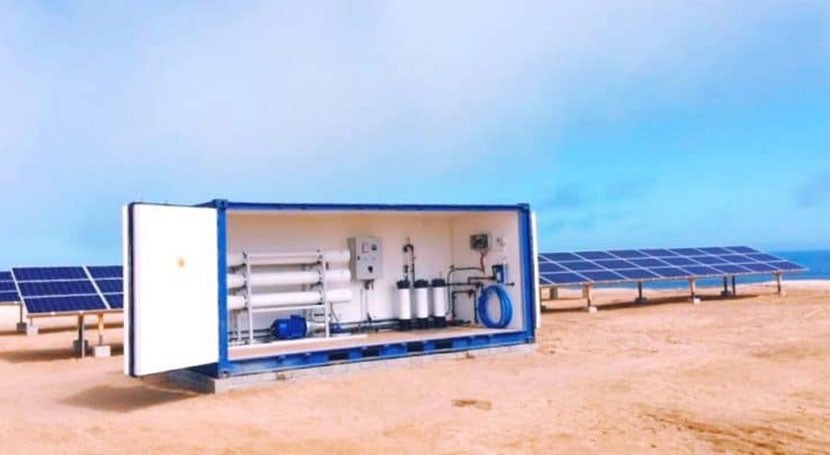Nefco has granted financing for Solar Water Solutions to speed up the internationalisation of its battery-free desalination systems. With its solar-powered water purification units that turn seawater or any contaminated water into drinking water, the company is tapping into the rapidly growing off-grid zero-emission desalination market, estimated to reach USD 35 billion globally by 2028, and enabling safe and sustainable water for drought-stricken rural communities.
The financing is provided through Nefco’s Green Recovery Loan Programme, which helps accelerate the growth and scale-up of Nordic green solutions on global markets.
Improving water security with zero-emission desalination
Solar Water Solutions provides small-scale, decentralised reverse osmosis desalination units powered by solar energy that can be easily integrated to use supplemental wind power or the grid during non-solar hours.
The green recovery financing from Nefco will enable Solar Water Solutions to cover working capital costs for manufacturing, delivering, and installing 10 water treatment units in Guelmim Oued Noun, a region in the southern part of Morocco. The project will be carried out in partnership with Atlas Inclusive Partners, a local green solutions company. For the last two years, the region has been experiencing its most extensive drought in history, which has led the regional government to seek decentralised water treatment systems with fewer operational and maintenance requirements.
The green recovery financing from Nefco will enable Solar Water Solutions to cover working capital costs for manufacturing, delivering, and installing 10 water treatment units in Guelmim Oued Noun
The novel configuration of Solar Water Solutions’ water treatment units significantly reduces both the cost and carbon footprint of the water purification process, making it one of the most cost-efficient solar-powered water treatment systems on the market. With an affordable, safe, and sustainable water supply for drinking and agricultural use, communities in water-scarce regions can improve their livelihoods and be less impacted by severe droughts. The company’s unique brackish water systems have up to 90 % recovery rate enabling ecological water purification saving the scarce groundwater sources.
Clean water without fossil fuels and e-waste
A family enterprise founded in 2015, Solar Water Solutions’ innovation for energy-efficient desalination is based on the extensive research of Heikki Pohjola, a Finnish engineer, whose focus has been on renewable energy for the past 25 years. The first pilot was developed in close co-operation with Aalto University Department of Energy Technology. The company partners with local professional water treatment specialists for the installation, services, and maintenance of the technology.
“The need for safe drinking water is global and increasing. Through responsible partnerships, we can revolutionise access to safe affordable water in rural areas together. Achieving the Sustainable Development Goals will not happen without the four key elements: a sustainable technology that brings down the cost of clean water, access to finance, local partners and a market-based business model,” says Antti Pohjola, CEO, Solar Water Solutions.
The financing from Nefco will also support the company’s expansion to other emerging markets, such as Madagascar and the Caribbean.
Expected direct environmental impact of the Solar Water Solutions’ systems throughout the product life cycle in Morocco according to the company’s calculations:
- Decreasing CO2emissions by 57 000 tonnes. Decentralised desalination units reduce CO2 emissions from water transportation as the water is purified and consumed locally. The 10 water treatment units to be delivered by the company will reduce CO2 emissions by 57 000 tonnes.
- Reducing waste by 1600 tonnes. Battery-free desalination units run purely on solar power. The project will prevent approximately 1600 tonnes of hazardous waste from used batteries from entering the ground.
- Improved water security in dry areas. Considering the increasing probability of droughts due to climate change, decentralised solar-powered water treatment systems provide a solution for adapting to climate change and improving water security.





